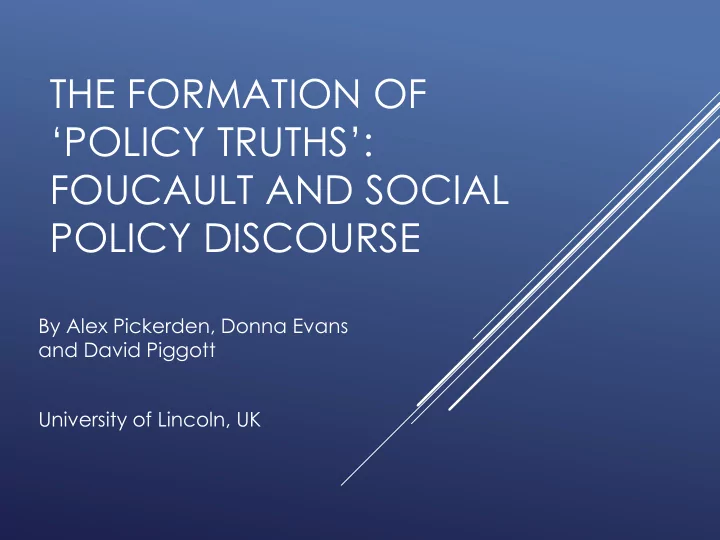

THE FORMATION OF ‘POLICY TRUTHS’: FOUCAULT AND SOCIAL POLICY DISCOURSE By Alex Pickerden, Donna Evans and David Piggott University of Lincoln, UK
PRESENTATION AIMS... Discuss current approaches to policy analysis Illustrate an alternative method for policy analysis influenced by the theoretical concepts of Michel Foucault Briefly analyse current research which has focused upon education policy and education reform in the United Kingdom (UK) Introduce the concept of ‘policy truths’ and explain how this idea can aid in the critique of neoliberal policies and neoliberal governmentality
CURRENT APPROACHES TO POLICY ANALYSIS... Policy analysis as a field of research and inquiry has grown as a direct result of the shift towards evidence-based policy under the New Labour government in the late 1990’s Policy sociologists need to produce work that is ‘useful’ and ‘useable’ (Shortall, 2013) Lingard (2013) makes the point that currently ‘evidence - informed policy’ is a more accurate depiction of what happens in the policy process
ALTERNATIVE WAY OF DOING POLICY ANALYSIS We need to understand ‘policy intentions’ before we debate and discuss ‘policy implications’ Policies need to be understood within a context of different values, ideologies, beliefs and principles; which themselves are linked and connected to the wider political intentions of those in power Policy translations and policy enactments (Ball et al. 2011)
FOUCAULDIAN THEORY: WHAT IT OFFERS... As Shortall (2013) articulates, “an interesting and unresolved element of the debate within evidence-based policy is whether it is the power of the idea or the power of the supporter which has most effect” (p.1093) Foucauldian critique highlights the relationship between power and truth. Utilising the concept of governmentality and the framework of power- knowledge illustrates how “that which is has not always been” (Oksala, 2007, p.11)
CRITICAL DISCOURSE ANALYSIS AND FOUCAULT... CDA allows for a detailed investigation of the relationship of language to other social processes, and how language works within power relations (see Taylor, 2004) Foucault (1982) argued that, “the target nowadays is not to discover what we are, but to refuse what we are” (p.216) For Jager and Maier (2009) CDA is a method by which we can “disentangle the giant milling mass of discourse” (p.36) and critically investigate the ongoing production of reality through discourse, conveyed by active subjects (p.37)
CURRENT RESEARCH… In terms of analysing neoliberal policies and political agenda’s, neoliberalism in some cases provides the tools for resistance and refusal (Ball & Olmedo, 2013) Globalised neoliberal social and economic policies (for which education is at the forefront). ‘Policy mimickery’ occurs in relation to both the policy intentions and the language Gunter (2011) The Academies Programme, Hatcher (2011) Free Schools under the Coalition – both make the arguments that we need to understand more about the inner-workings and practices of these policies at the micro (intensive) scale
THE FORMATION AND CONVERGENCE OF ‘POLICY TRUTHS’... 1) Academies are more aspirational and offer more rigorous education than other state maintained schools 2) Academies tackle underperformance through their autonomous status 3) Academies help close the attainment gap between the richest and the poorest children
POLICY TRUTHS, POLICY PROCESS, POLICY ANALYSIS... So what do policy truths offer to the field of policy studies and analysis as a theoretical concept? Place more immediate attention on understanding the intentions of policymakers and politicians Encourage the policy process to be viewed as a dynamic and fluid interplay between different values, ideologies and power relations Illustrate the fact that there is no single reading of policy texts and policy discourses (Taylor, 1997) Argue the fact that policy analysis should move towards analysing specific micro-level phenomena within the macro- level context Highlights the need to look more at policy translations and policy enactments (Ball et al. 2011)
CONCLUSION... Policy analysis should be theoretical, critical and reflexive but should always be ‘useful’ and ‘useable’ Intentions before implications – real-world policy solutions to real-world policy problems Policy truths are an interesting developmental concept by which we can critique policy-makers intentions and assumptions
REFERENCES... Ball, S. J., Maguire, M. and Braun, A. (2011) How Schools do Policy: Policy Enactments in Secondary Schools . London: Routledge. Ball, S. J. and Olmedo, A. (2013) Care of the self, resistance and subjectivity under neoliberal governmentalities, Critical Studies in Education , 54(1), pp.85-96. Foucault, M. (1982) The Subject and Power, Critical Inquiry , 8(4), pp.777-795. Gunter, H. M. (ed.) (2011) The State and Education Policy: The Academies Programme . London: Continuum International Publishing Group. Hatcher, R. (2011) The Conservative- Liberal Democrat Coalition governments “free schools” in England, Educational Review , 63(4), pp.485-503. Jager, S. and Maier, F. (2009) Theoretical and methodological aspects of Foucauldian critical discourse analysis. In : Wodak, R. and Meyer, M. (eds.) Methods of Critical Discourse Analysis. London: Sage Publications. pp.34-61. Lingard, B. (2013) The impact of research on education policy in an era of evidence-based policy, Critical Studies in Education , 54(2), pp.113-131. Oksala, J. (2007) How to Read Foucault . London: W. W. Norton & Company. Shortall, S. (2013) The Role of Subjectivity and Knowledge Power Struggles in the Formation of Public Policy, Sociology , 47(6), pp.1088-1103. Taylor, S. (1997) Critical policy analysis: exploring contexts, texts and consequences, Discourse: Studies in the Culturalm Politics of Education, 18(1), pp.23-35. Taylor, S. (2004) Researching Education Policy and Change in ‘New Times’: Using Critical Discourse Analysis, Journal of Education Policy , 19(4), pp.433-451.
QUESTIONS...
Recommend
More recommend